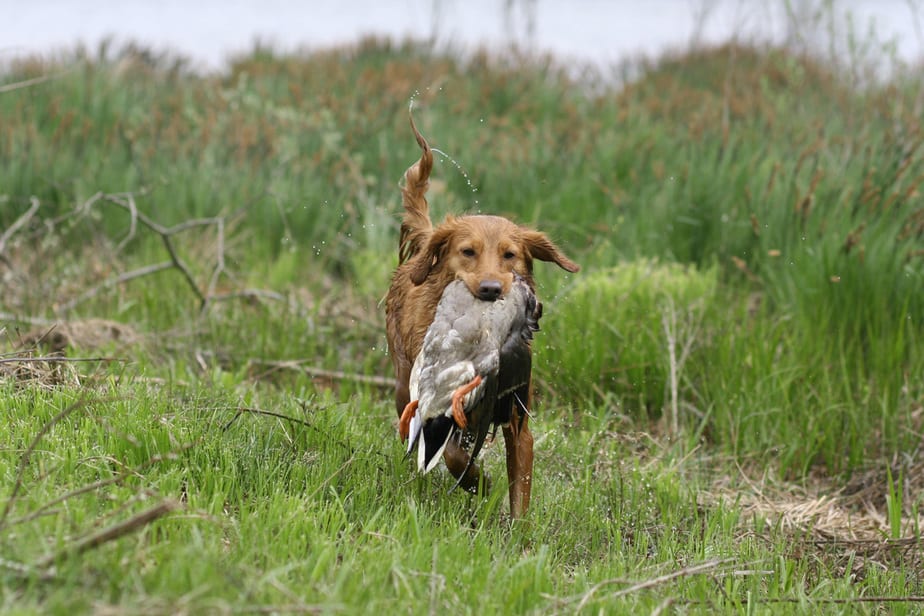You may have researched varying breeds and come to the conclusion that a Nova Scotia Duck Tolling Retriever is the best fit for your life. However, what happens if you currently have a cat or want to add a cat to your household?
The smallest breed of retriever, the Nova Scotia Duck Tolling Retriever, is also a personal favorite breed of mine. Both of my current dogs are Nova Scotia Duck Tolling Retrievers, affectionately referred to as “Tollers” by owners of the breed.
So let’s answer the question, are Nova Scotia Duck Tolling Retrievers good with cats? And how to introduce them to each other.
Prey Drive and Tollers
In general, Tollers are a very active breed. While they are a small breed of retriever that sometimes resembles a dark red Golden Retriever, their personalities are very different.
Tollers are often said to be closer to Border Collies in terms of their busy brains and high energy than Golden Retrievers.
Nova Scotia Duck Tolling Retrievers tend to have higher prey drive than many other breeds, especially since they are a breed of dog bred for hunting.
This prey drive often results in the desire to chase small animals, which may include cats.
It’s important to take a look at the series of events that occur in prey drive. These behaviors include:
- Searching for prey.
- Stalking prey.
- Chasing prey.
- Biting to hold.
- Biting to kill.
While prey drive is common to many dogs, how far their prey drive progresses will vary.
For example, in Border Collies, the prey drive sequence often stops at number 2 – stalking. A border collie that chases and bites their flock of sheep is not very useful for herding.
Rather, the ideal Border Collie will have a strong prey drive sequence that allows them to stalk – and thus, herd.
In Nova Scotia Duck Tolling Retrievers, and other breeds of dog used in hunting, the sequence tends to progress further.
It wouldn’t be very much use to a duck hunter to have a dog that simply stalks a dead bird in the water – rather, the ideal retriever will chase down the fallen bird and bite to hold it while bringing it back to their owner.
Similarly, a retriever that bites to kill animals is not very useful. Tollers, and other retrievers, are supposed to have a “soft mouth” that allows them to bring the animal back without damaging them.
For some Tollers, this prey drive sequence results in a strong desire to chase cats, occasionally to bite at them.
It would certainly not be unexpected to have a Toller that finds great fun in chasing cats or other small animals, including squirrels and rabbits.
However, this doesn’t mean that Tollers can never get along with cats. Instead, it means that you may have to plan on utilizing management strategies to keep your cat safe, rather than relying on your dog to get along with your cat.

Nova Scotia Duck Tolling Retrievers and Cats
With proper socialization, as well as by choosing a Toller with lower prey drive, your Toller and cat can learn to get along with each other. It’s never a guarantee when you mix two species together, but it’s possible through training and proper introduction.
My own personal Tollers are able to live in a home with cats, although we do not currently have cats of our own. However, when visiting friends and family, they have learned to be respectful of indoor cats and to give them their space.
If a cat is outside, however, they frequently react the same way they do when they see squirrels or rabbits in the backyard by emitting the “Toller Scream” and chasing the animal if they have a chance.
They are also certainly interested in indoor cats, and should a cat choose to run across the room, they are likely to dart after the cat before I call them back.
Whether or not your Toller and cat get along depends on the personality of the Toller as much as the personality of the cat.
Cats that are more comfortable with dogs and will stand their ground rather than run away are less likely to be chased, because they are less likely to trigger a dog’s prey drive by darting across the room quickly.
Most Toller owners that have cats have reported the best success when their Toller was introduced to cats as a very young puppy.
This gives your Toller the opportunity to learn how to interact with cats while they are still learning how to interact with their world, rather than after they have made up their mind that cats are for chasing.
If you already have a cat in your home before bringing home your Toller puppy, this job is often quite easy.
However, if you don’t own a cat, but know that you may want to own a cat in the future, it’s helpful to look for other cats that you can introduce your Toller to while they are still young.
Introducing Tollers and Cats
A Nova Scotia Duck Tolling Retriever should meet a cat at a very young age for the best success at integrating Tollers and cats into the same household. Puppies have a socialization period that occurs from about 3-16 weeks of age, and introductions during this time will be the most effective.
If your Toller’s breeder is able to introduce the puppies to cats before they come home to you, it’s a great way to give your Toller puppy a head start at learning that cats are friends.
However, after you bring your Toller puppy home, you need to continue this socialization. Having a cat in your own home is the most useful way to introduce your Toller to a cat, but you can also do this by visiting the homes of friends or family that have dog-friendly cats.
It’s important to reward your Toller for calm behavior around cats, rather than allowing them to chase the cat or otherwise bother the cat.
Keeping your Toller on a leash can help you control the introduction, as well.
Besides helping your Toller feel comfortable around the cat, it’s important that your cat feels comfortable, too.
Your cat should be allowed to leave the situation if they are scared. This means that you should let your cat come and go in the room as they please, rather than holding your cat and forcing them to meet.
It’s also ideal if your cat has places they can climb to that are out of the reach of your Nova Scotia Duck Tolling Retriever. This will help your cat feel more comfortable observing the situation.
If your Toller wasn’t introduced to cats as a puppy, but you now want to add a cat to your family, it’s ideal to adopt a cat that already is friendly with dogs.
Cats that run and hide from dogs are much more likely to trigger a dog’s prey drive, as well as simply just be stressed out about the situation.
Before adopting a cat, it’s best to test them with a dog to see how comfortable they are with canine friends. Shelters may have their own dogs to test with cats, or they may want your Toller to specifically meet the cat.
After bringing the cat home, make sure they have their own space where they can feel safe and be away from your Toller. Ideally, this space will often have their litter box, food, and water in order to prevent any bad habits from forming in a cat that isn’t comfortable going to their litter box room.
A baby gate can often be a great solution to allow a cat entrance to a room while keeping your Toller on the other side.
With the cat feeling safe and secure, it’s time to introduce the Toller to the situation as well. This is best done in short sessions, after your cat has settled into your home.
Keeping your Toller on a leash and having highly rewarding treats will allow you to keep your Toller’s focus and attention, while keeping everyone in the situation as safe as possible.
Novia Scotia Duck Tolling Retrievers: Shedding Guide
As the dust bunnies around my home will tell you, Nova Scotia Duck Tolling Retrievers can shed quite a bit! Regular grooming, sweeping, and vacuuming can keep their loose hair to a minimum, but unless [...]
Are Tollers Good Family Dogs?
Novia Scotia Duck Tolling Retrievers are exceptionally happy dogs in general, and most owners find it impossible to have a bad day when watching their Toller play. However, these traits don’t necessarily make Tollers the [...]
Are Tollers Good Apartment Dogs?
If you’ve fallen in love with Nova Scotia Duck Tolling Retrievers, but live in an apartment, you may be wondering how feasible it is to live in an apartment with a Toller. Whether or not [...]
Nova Scotia Duck Tolling Retrievers and Cats
You may have researched varying breeds and come to the conclusion that a Nova Scotia Duck Tolling Retriever is the best fit for your life. However, what happens if you currently have a cat or [...]








